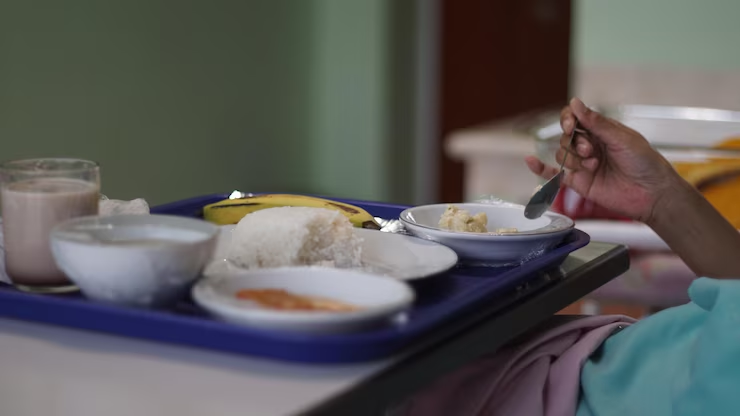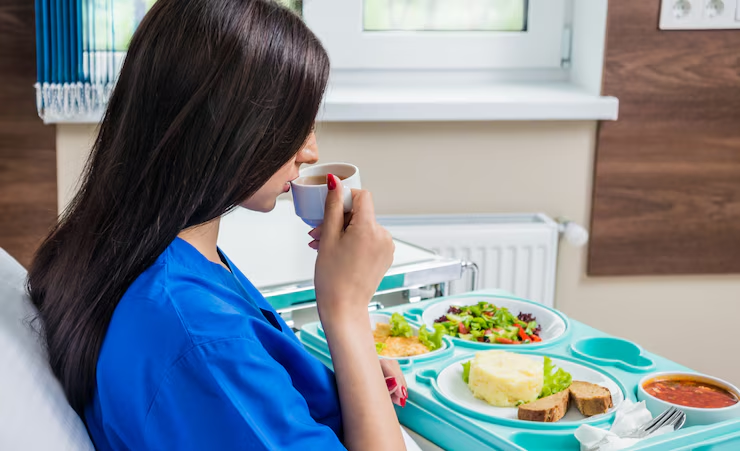A Diet Chart for Covid Negative Patients in India focuses on rebuilding strength, improving immunity, and restoring energy after illness or exposure risk. Even if a person tests negative, proper nutrition supports recovery from weakness, stress, or mild symptoms. Balanced meals rich in protein, vitamins, minerals, and hydration help the body regain resilience and overall wellness.
In this article, we share a detailed diet chart for covid negative patients in India, along with tips, food suggestions, and nutritional guidelines suitable for patients of all age groups.
Why a Recovery Diet Matters After COVID?
Recovering from COVID-19 doesn’t end when the fever drops or the oxygen levels stabilize. The post-COVID phase often brings weakness, fatigue, loss of appetite, muscle loss, anxiety, and digestive issues. A carefully curated post-COVID recovery diet helps patients regain energy, restore immunity, rebuild lost muscle mass, and improve overall well-being.
COVID-19 may last a few days or weeks, but its impact on the body lingers long after the infection clears. Many patients experience prolonged weakness, muscle loss, digestive issues, brain fog, and poor immunity even after testing negative. This is where a recovery-focused diet becomes critical.
A thoughtfully planned post-COVID diet restores strength, rebuilds immunity, and helps the body bounce back faster. Here’s why a recovery diet is essential after COVID-19:
Replenishes Lost Nutrients:
During illness, especially if the appetite is low, the body loses essential nutrients like vitamins, minerals, and protein. A recovery diet:
- Replaces lost electrolytes (like potassium, sodium)
- Restores vitamin stores (Vitamin C, D, B-complex)
- Rebuilds protein and iron levels to fight fatigue
Rebuilds Muscle Strength and Energy:
COVID-19 often causes muscle breakdown due to prolonged rest or inactivity. Many patients also lose weight unintentionally.
A high-protein recovery diet:
- Helps rebuild muscle mass
- Increases energy and stamina
- Supports post-exertion fatigue
Strengthens Immunity:
Even after the virus is cleared, the immune system stays weakened and vulnerable to secondary infections.
A nutrient-rich diet (rich in Vitamin C, D, zinc, selenium, omega-3s) enhances:
- Immune cell regeneration
- Antioxidant protection
- Inflammatory control
Improves Appetite and Digestion:
Many people experience loss of appetite, altered taste/smell, or digestive issues like acidity and bloating post-COVID.
Foods like:
- Curd, buttermilk (probiotics)
- Jeera or ajwain water
- Small, warm meals with herbs and mild spices
Supports Lung and Respiratory Healing:
COVID-19 affects the lungs, and post-recovery, some patients experience breathlessness or reduced oxygen capacity.
Nutrients like Vitamin D, A, omega-3s, and antioxidants aid:
- Lung tissue repair
- Reduced inflammation
- Better oxygen transport
Aids Mental and Emotional Recovery:
Post-COVID anxiety, sleep disturbances, and mental fatigue are common.
A recovery diet rich in:
- B-vitamins, magnesium, omega-3s (from nuts, seeds, whole grains)
- Herbal teas and adaptogenic foods
Prevents Long COVID Symptoms:
A poor diet can prolong recovery and increase the risk of Long COVID, where symptoms like tiredness, cough, or brain fog persist for weeks or months. A balanced recovery diet lowers this risk.
Food becomes medicine when recovering from COVID-19. Prioritizing a nutrient-dense, home-cooked, and hydrating diet speeds healing and prevents complications.

Diet Chart for Covid Negative Patients in India:
This sample diet chart is designed to support recovery after COVID-19 by focusing on immunity-boosting, energy-restoring, and digestion-friendly Indian meals. It is suitable for mild to moderate recovery cases and includes both vegetarian and non-vegetarian options. See below the diet chart for covid negative patients in India.
| Time | Meal | Vegetarian Option | Non-Vegetarian Option |
|---|---|---|---|
| 6:30 AM | Wake-Up Drink | Warm water with lemon + 4 soaked almonds | Same |
| 8:00 AM | Breakfast | Vegetable daliya or oats + curd + papaya | Boiled egg/toast + curd + banana |
| 10:30 AM | Mid-Morning Snack | Coconut water + roasted makhana | Coconut water + boiled egg or fruit |
| 1:00 PM | Lunch | Brown rice + dal + lauki/palak + cucumber salad + curd | Steamed rice + chicken curry/fish + sabzi + curd |
| 3:30 PM | Post-Lunch Drink | Jeera water or buttermilk | Same |
| 5:00 PM | Evening Snack | Moong chilla or roasted chana + tulsi/ginger tea | Egg sandwich or chicken soup + ginger tea |
| 7:30 PM | Dinner | Moong dal khichdi + steamed vegetables + glass of buttermilk | Rice + light fish curry + sautéed vegetables + curd |
| 9:00 PM | Bedtime Drink | Turmeric milk (haldi doodh) with a pinch of black pepper | Same |
Foods To Include in Diet Chart for Covid Negative Patients in India:
- Immunity boosters: Amla, tulsi, ginger, turmeric, garlic
- Energy restorers: Rice, oats, sweet potatoes, jaggery
- Muscle builders: Paneer, soy, tofu, chicken, eggs, legumes
- Gut healers: Curd, buttermilk, bananas, jeera water
- Mental wellness foods: Nuts, seeds, oats, dark chocolate (in moderation)
Foods to Avoid in Diet Chart for Covid Negative Patients in India:
- Packaged or processed snacks (chips, biscuits, sugary drinks)
- Fried or oily foods
- Excessive sugar or sweets
- Cold drinks and ice creams (may aggravate cough)
- High caffeine or alcohol (dehydrating)
Lifestyle Tips for Faster Recovery:
- Rest is essential: Sleep 8–9 hours per night
- Gradual exercise: Begin with deep breathing, short walks
- Sunlight exposure: For natural Vitamin D synthesis
- Stress management: Meditation, calming music, pranayama
- Monitor appetite and weight: Eat even if appetite is low — small, frequent meals help
Conclusion:
Nutrition is the cornerstone of healing after COVID-19. A balanced, protein-rich, antioxidant-packed Indian diet tailored for post-COVID recovery can help rebuild immunity, restore energy, and support long-term health. Along with good food, adequate hydration, rest, and a positive mindset are key to full recovery.
Following a well-planned Diet Chart for Covid Negative Patients in India can play an important role in restoring health, boosting immunity, and supporting long-term recovery. Nutritious home-style meals, adequate hydration, and a balanced intake of essential nutrients help the body regain strength and maintain overall well-being. Consistent healthy eating habits are key to faster recovery and sustained health.
FAQ:
Q. How long should I follow a recovery diet?
A. Usually for 2–4 weeks, or until strength and appetite return to normal.
Q. Can I take supplements post-COVID?
A. Yes, multivitamins (Vitamin C, D, Zinc) may help, but only under doctor’s supervision.
Q. Should I avoid dairy after COVID?
A. No, unless you have phlegm or lactose intolerance. Curd and milk are good sources of protein and probiotics.
Q. Can children follow this recovery diet?
A. Yes, with age-appropriate portion sizes and adjustments for taste/preferences.
Q. Is non-veg food safe during recovery?
A.Yes, light preparations like boiled eggs, grilled chicken, or fish are beneficial for protein recovery.
